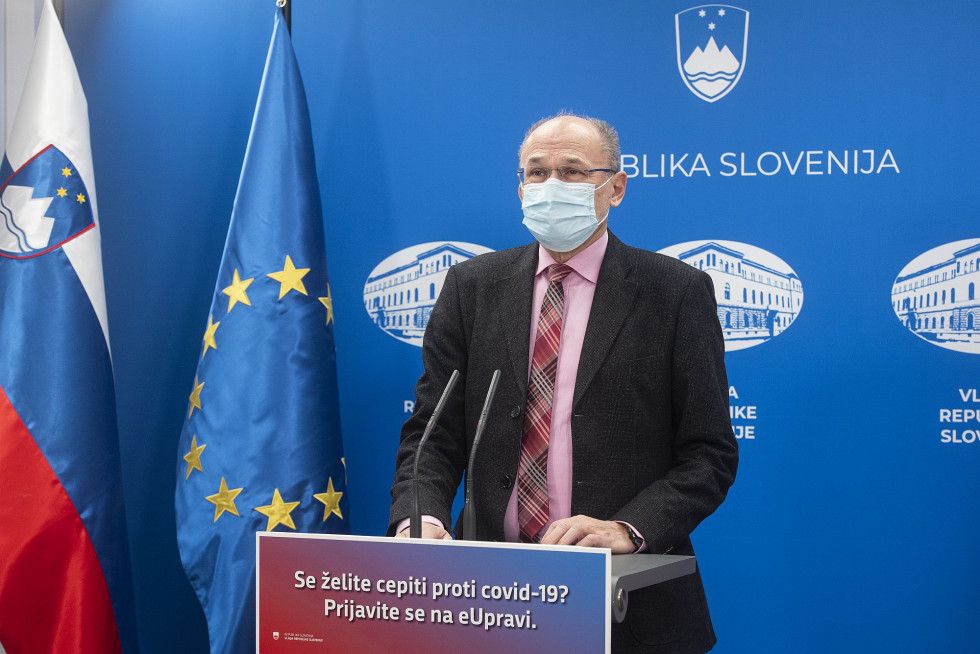Mayors may have a strong impact on the management of the epidemic in regions

Spokeperson Jelko Kacin | Author Bor Slana
6579 tests were carried out yesterday, 2107 persons tested positive. The share was 32 percent. In absolute numbers, there were 32 fewer positive cases than the previous Tuesday. The number of new positive cases in the same period in the last 4 days, compared to the same period in the previous week, has been decreasing for the fourth day in a row, said the government spokesperson, Jelko Kacin. 1251 covid patients required hospital care yesterday, which is 33 fewer than on Monday. 211 patients were in intensive care units, which is 7 more than the day before. 24 persons died in hospitals, and 15 in retirement homes; a total of 39 deaths. There were 117 hospital admittances yesterday and 128 hospital releases.
Based on the number of new positive cases, the following municipalities stand out: Novo mesto 110, Krško 40, Trebnje 23, Celje 46, Slovenske Konjice and Slovenska Bistrica 40, Žalec 31, Šentjur 29, Polzela 28, Vojnik 23, Murska Sobota 34, Koper 31, Sežana 41, Ljubljana 149, Maribor 57, Kranj 58. 204 retirement home residents and 82 employees were confirmed as recovered yesterday. 134 new positive cases were recorded in retirement home residents yesterday, and 56 in employees. The highest number of new positive cases (more than 10) was reported at DSO Sežana (24), Senecura Vojnik (11), and DSO Polzela (15).
There are 323 hospitalised patients at the Ljubljana University Medical Centre (UKC), some of them are birthing mothers and children. There have been 2348 hospitalised patients to-date, 336 in intensive care units, which is 15 percent of all patients. 50 percent of all hospitalised patients were older than 75 years, the average age of hospitalised patients is 70 years. 289 people in total died at the UKC. Regular and intensive covid departments are still active in various locations. Regular patients with other infectious diseases have been placed in other UKC departments.
The head of the clinic for infectious diseases, Tatjana Lejko Zupanc, believes that the circumstances are slowing down at a microscopic rate. She is worried about the burnout of employees. Assessing the impact of the lifted measures in these days leading up to 23 December is an thankless task. The key matter is for people to respect the measures. UKC gathered vaccination applications from all groups of employees and received 3,000 applications, which is inadequate. In terms of organisation, they are ready for vaccinations, and they will vaccinate their employees without a problem.
Regarding the measures over the holidays, Mrs Zupanc discourages gatherings, while each family should judge for themselves which one of their members is critical regarding the spread of the virus to others. Regarding the measures in schools, she recommends maintaining distances in classes, children in higher grades could wear masks, and classrooms should be ventilated after every session.
The deputy head of the Centre for Infectious Diseases at NIJZ, Nuška Čakš Jager, presented the trends of the positive cases in some European countries, whereby comparisons include the days between 1 and 7 December and the days between 8 and 14 December. The list of countries where the situation is worsening is getting longer; the first three countries are Denmark, Slovakia, and the Netherlands. The middle of the list includes the Czech Republic, Great Britain, France, and Germany, while Sweden, Croatia, and Finland have a minimal percentage increase. Countries where the situation is calming down are Italy, Spain, Greece, Poland, Hungary, and Austria.
The total number of positive cases between residents has been reducing for a couple of days, while the number is fluctuating daily. The vaccination strategy is being directed and managed by the Ministry of Health, and NIJZ is active in the planning and implementation. Their department will decide on the distribution of vaccine doses in Slovenia. In mass rapid tests, the decision on whether an additional PCR test is necessary will be made on a case-by-case basis. Mayors have a major influence on managing the situation in regions. The flu season has not started yet, neither in Slovenia nor in the EU.

